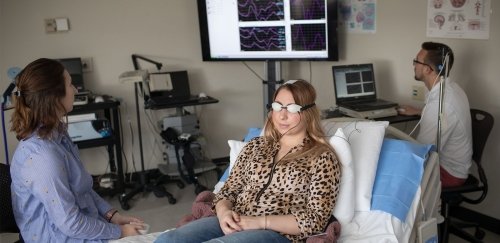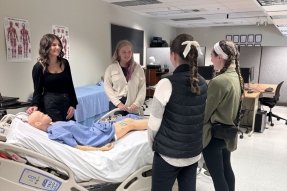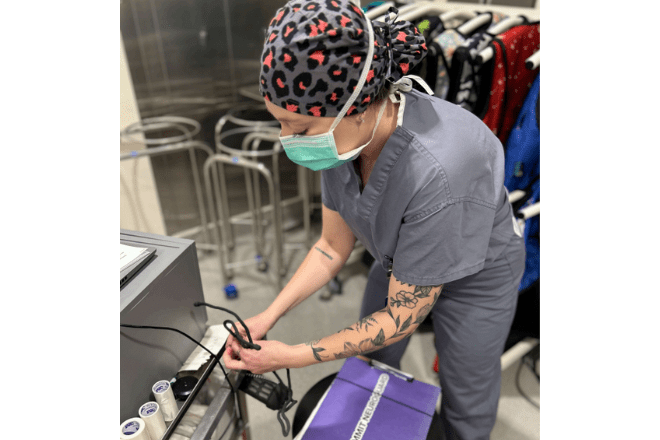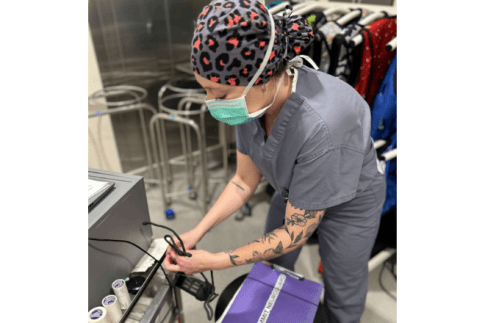
Intraoperative Neurophysiologic Monitoring Certificate
Intraoperative Neurophysiologic Monitoring (IONM) encompasses the application of a wide variety of electrophysiological methods to monitor the functional integrity of neural structures during surgery. This certification prepares you to monitor the state of a patient's nervous system in “real-time” during surgery to improve patient safety and surgical outcomes.
- Degrees & Offerings
-
- Certificate
- Location
-
- Bloomsburg
- Online
- Department
- Program Contact
-
Professor of Audiology, program coordinator, IONM
Program Details

- ** We're not accepting applications for the IONM program at this time.
- Program Goal - Commonwealth University - Bloomsburg's IONM post-baccalaureate certificate program is aimed to bridge the gaps between the increasing demand of qualified technologists and lack of formal educational programs.
- Program Options - The IONM program is offered in 2 separate formats:
>> In-Person Certificate: Includes 33 credits over 3 semesters and can be completed in 1 year. Program includes a required clinical practicum.
>> Online Program: Includes 18 credits over 2 semesters, and no required practicum. - Delivery - Offered both in-person and 100% online.
- Program Length - The program can be completed in one year.
- Who Should Apply - Common applicant majors include health sciences, speech-language pathology and audiology, exercise science, biology, and communication sciences and disorders.
Request InformationCost Estimator
What is IONM?
Intraoperative Neurophysiologic Monitoring (IONM) applies various electrophysiologic methods to monitor the functional integrity of the nervous system during surgery.
The IONM technologist provides neurofunctional feedback and guidance during surgery to protect the brain, spine, and peripheral nervous systems from iatrogenic injury.
IONM benefits a variety of surgeries, including neurosurgery, vascular surgery, ENT surgery, orthopedic surgery, cardiac surgery, interventional radiological procedures, genitourinary surgery, and other type of surgeries.
IONM training disciplines include human functional neuroanatomy, neurodiagnostic technology, electrophysiology, pathophysiology, biology base of human disease, neurosurgery, spinal Surgery, ENT surgery, vascular surgery, orthopedic surgery, and neuroanesthesia.
Courses and Curriculum
Commonwealth U - Bloomsburg is one of the few programs in the country offering IONM training. Our graduates are highly sought after by various IONM providers nationwide. This graduate-level certificate program provides a year of training (33 credit hours) for students with a bachelor's degree to pursue a career as an IONM technologist.
Degree Requirements Degree Works
Note: Degree requirements effective for enrolled students beginning Fall 2023. All enrolled students, including matriculating students prior to Fall 2023, can review their degree program requirements and track progress to degree completion with our degree audit and advisement tool, Degree Works.
- A bachelor's degree is required for admission to the certificate program. This graduate certificate program will review and consider applications from a wide variety of educational backgrounds.
- However, to help ensure success in this certificate training, priority applicants should have had previous academic coursework in at least three of the following areas of study: anatomy, physiology, human biology, chemistry, mathematics, statistics, psychology, medical terminology, personal health, medical ethics, and applied physics for the health sciences, or similar courses.
- This one-year certificate program (12 credit hours per semester, total 36 credit hours) will be promoted to students from undergraduate academic programs such as speech pathology and audiology, exercise science, biological and allied health sciences, nursing, psychology and medical physics..
- Applicants who do not have the expected foundational coursework may be accepted provisionally pending completion of a program of prerequisite study incorporating three of the aforementioned areas of study.
| Fall | Spring | Summer |
|---|---|---|
CMSD 650
| CMSD 651
| CMSD 661 IONM Instrumentation and Practical Application III Total = 5 credits |
Practicum Track Degree Requirements (Effective Fall 2023)
- CMSD 650 Introduction to IONM
- CMSD 651 IONM Functional Human Neuroanatomy
- CMSD 652 Clinical Neurophysiology: Evoked Potential/Electromyography
- CMSD 654 Clinical Neurophysiology: Electroencephalography/Biophysics
- CMSD 656 IONM Cranial and Vascular Surgery
- CMSD 657 IONM Spine Surgery
- CMSD 659 IONM Instrumentation and Practical Application I
- CMSD 660 IONM Instrumentation and Practical Application II
- CMSD 661 IONM Instrumentation and Practical Application III
| Fall | Spring |
|---|---|
CMSD 650
| CMSD 651
|
Online Non- Practicum Track Degree Requirements (Effective Fall 2024)
- CMSD 650 Introduction to IONM
- CMSD 651 IONM Functional Human Neuroanatomy
- CMSD 652 Clinical Neurophysiology: Evoked Potential/Electromyography
- CMSD 654 Clinical Neurophysiology: Electroencephalography/Biophysics
- CMSD 656 IONM Cranial and Vascular Surgery
- CMSD 657 IONM Spine Surgery
- Follow biomedical safety standard
- Place electrodes at the appropriate anatomical site to acquire responses
- Differentiate between nomral and abnormal neurophysiologic responses
- Be eligible as an entry-level IONM technologist after brief on-board training by employers
Commonwealth University - Bloomsburg Department of Communication Sciences and Disorders is committed to preparing clinicians for the workplace. The process of learning the necessary skills for this outcome may vary student by student. The purpose of remediation is to provide students with opportunities to demonstrate knowledge and skills in academic and clinical areas. Remediation is intended to facilitate student success and assist with progress toward meeting degree requirements. Both summative (final, at the conclusion of a course/program) and formative (during, periodically throughout a course/program) assessments are used in evaluating students’ progress. Students whose academic or clinical performance falls below graduate expectations will receive remediation opportunities as part of formative assessment. Students are encouraged to take advantage of remediation opportunities to avoid academic consequences such as course repeats or recommendations for dismissal from the program. Remediation may include but is not limited to a clinical skills development plan, revision or completion of equivalent academic coursework, re-examination, or other methods as stipulated by instructional faculty and, where necessary, in conjunction with clinical staff. Students requiring remediation will complete and sign a remediation plan form, which will be retained in their academic file. Remediation plans may be developed by faculty and/or clinical supervisors together with students.
- Q: What is IONM?
A: Intraoperative Neurophysiologic Monitoring (IONM) encompasses the application of a wide variety of electrophysiological methods to monitor the functional integrity of neural structures during surgery. This certification prepares you to monitor the state of a patient's nervous system in “real-time” during surgery to improve patient safety and surgical outcomes. - Q: What subjects are covered in the IONM program?
A: IONM training disciplines Include human functional neuroanatomy, neurodiagnostic technology, electrophysiology, pathophysiology, biology base of human disease, neurosurgery, spinal Surgery, ENT surgery, vascular surgery, orthopedic surgery, and neuroanesthesia. - Q: Is there a required undergraduate major needed for admission?
A: No - But priority consideration is given to students from health sciences, communication disorders, exercise science, and biology. - Q: What is the career outlook for IONM professionals?
A: The nationwide demand for qualified IONM professionals is very high. The average salary range is between $72,000 and $99,000 per year (ZipRecruiter). IONM professionals are employed by major hospitals as well as private companies. - Q: How is the program delivered?
A: Offered both in-person and online.
ONWARD AND UPWARD
Careers
IONM technologists are in high demand and are employed by major hospitals as well as private companies. The nationwide demand for qualified IONM technologists is very high. The current average salary for IONM technologists is approximately $70,000/year. Career options include:
Potential Job Opportunities
- IONM Specialist
- Surgical Neurophysiologist
- Neurophysiology Supervisor
- IONM Technician
- Neuromonitoring Technologist
- CNIM Neurophysiologist

Student Handbook
Intraoperative Neurophysiological Monitoring (IONM) Student Handbook
Connect with our Faculty
Applying to Graduate Programs
Apply
-
Application Process
Review the step-by-step application process for graduate school at Commonwealth University.
-
Apply Now
By starting your application, you gain access to your personalized application portal to view your progress.
-
Contact Us
If you have questions, we have answers. Contact us today!
Explore More
-
Grad Assistantships
Help finance your grad degree. Gain professional experience. Grow your network.
-
Tuition and Fees
Earning an advanced degree is an investment in your future. See just how affordable a graduate degree can be for you.
-
Understanding Financial Aid
Our Financial Aid team is your guide to navigating the aid process for your graduate degree.





